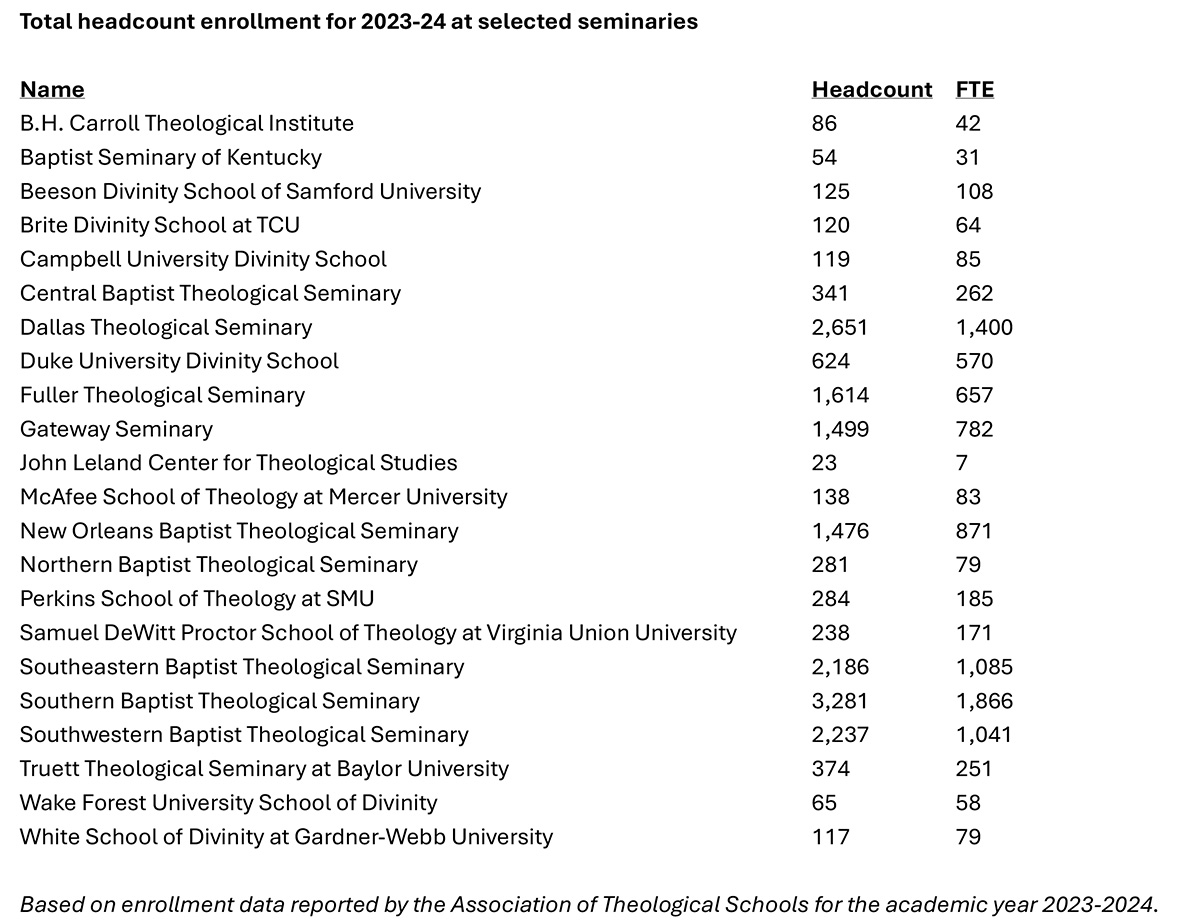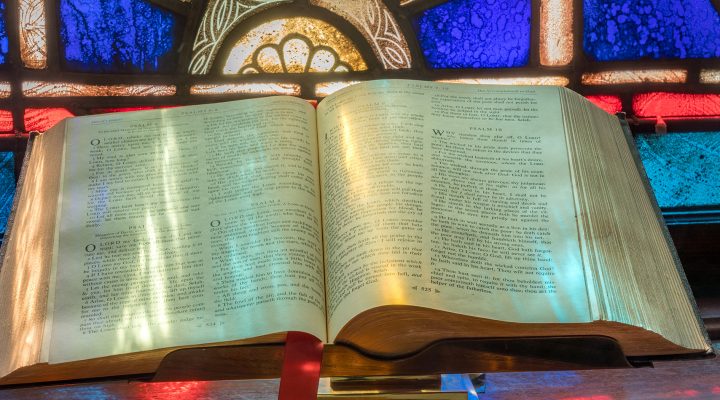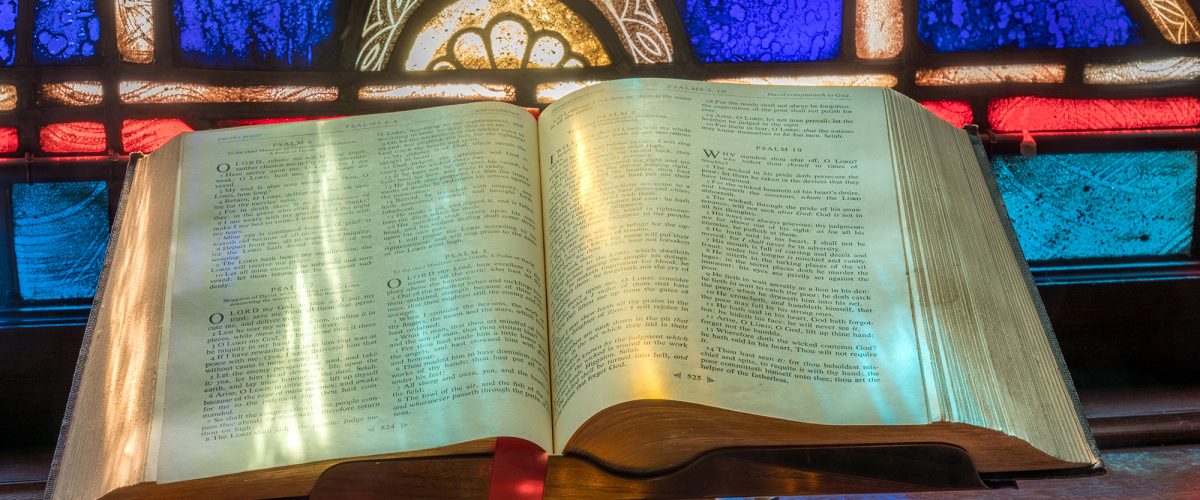All six of the Southern Baptist Convention’s seminaries remain in the top 10 largest schools in the United States, according to new data from the Association of Theological Schools.
Even Southwestern Seminary in Fort Worth, Texas, despite its recent financial and enrollment challenges, remains one of the largest seminaries in the nation — by both headcount enrollment and full-time equivalent enrollment.
For decades, the SBC schools have dominated a theological education market that is populated mainly with smaller schools of a few hundred students. While Southwestern may be a shadow of its former self, it still educates more students than the average American seminary.
For the 2023-2024 academic year, only 16 seminaries in the U.S. reported a total headcount enrollment of more than 1,000, and only 11 more reported a total headcount of greater than 500 but less than 1,000. That means only 12% of the 237 U.S. schools affiliated with ATS enrolled more than 500 students.
When it comes to FTE enrollment — an average calculated by headcount enrollment adjusted by what counts as a full-time load — only six schools in the U.S. reported more than 1,000 students and another 14 reported more than 500 but less than 1,000. Together, they accounted for 14% of all ATS-accredited schools in the U.S.
By either measure, Liberty Theological Seminary at Liberty University in Lynchburg, Va., is the largest American seminary by far.
By either measure, Liberty Theological Seminary at Liberty University in Lynchburg, Va., is the largest American seminary by far. Its headcount enrollment of 5,507 and FTE enrollment of 4,050 puts it in the place long ago held by Southwestern Seminary, which in the 1970s and 1980s billed itself as “the world’s largest theological seminary.”
Liberty’s John W. Rawlings School of Divinity dates to 1973, founded just two years after Jerry Falwell and his Thomas Road Baptist Church launched Liberty University. The divinity school took off within the past two decades, however, as it embraced distance learning. In the latest academic year, the school reported only 25 full-time faculty members but a faculty FTE of 1,007. That is vastly disproportionate to the faculty of any other ATS school and illustrates the virtual nature of the school.
Because of its ties to Thomas Road Baptist Church — founded as an independent Baptist church but now a Southern Baptist church — Liberty draws students who come from and go back to serve in SBC congregations.
Within the official SBC orbit, however, Southern Seminary in Louisville, Ky., is the largest of the six denominational schools. It took that title away from Southwestern years ago, outpacing its sister school, which began experiencing numerical decline under the leadership of former President Paige Patterson.
One in five students
One thing that hasn’t changed is that the SBC remains the largest purveyor of theological education in the United States. With a combined headcount enrollment of 13,471 students in its six seminaries last year, the SBC was training nearly one in five (18.8%) of all seminary students nationwide.
There have been other changes over the last few decades, including the rising influence of nondenominationalism. Consider Dallas Theological Seminary, a nondenominational school tied to the Bible church movement. Thirty years ago, DTS reported a headcount enrollment of 1,221 and an FTE enrollment of 752. Last year, DTS ranked as the fourth largest seminary in America with a headcount enrollment of 2,651 and an FTE enrollment of 1,400.
Few other seminaries have doubled their enrollment in the past 30 years.
Few other seminaries have doubled their enrollment in the past 30 years of general decline in theological education.
DTS is as theologically conservative as all the SBC seminaries and espouses an end-times theology (premillennial dispensationalism) that is widely accepted in SBC seminaries today. The primary difference is lack of denominational label.
One of the other changes the ATS data cannot quantify is the intermingling of students and churches of different labels. Anywhere from one-fourth to one-third of students enrolled in SBC seminaries are not Southern Baptists. And you are just as likely to find a conservative Southern Baptist church calling a pastor or staff member who was educated at DTS or Liberty as at a denominational school.
This didn’t use to happen — at all.
In Dallas, where I live — home base to DTS — you’d be hard pressed today to find much difference between a loyal SBC church and a nondenominational Bible church. That, too, is a major shift related to the changing nature of theological education.
Moderate to progressive theological education
Part of the diaspora from the SBC after the victory of conservatives — or fundamentalists, depending on who’s doing the labeling — was the rise of a host of new moderate to progressive Baptist seminaries and Baptist houses of studies at other seminaries and divinity schools and new partnerships with other Baptist-related schools.
The combined headcount enrollment at the remaining eight explicitly Baptist seminaries tied to this movement was only 1,377 last year. That combined total is smaller than the enrollment at the smallest of the SBC seminaries, New Orleans Seminary, which reported a headcount of 1,476.
The eight schools mentioned above are McAfee School of Theology at Mercer University, John Leland Center for Theological Studies, Christopher White School of Divinity at Gardner-Webb University, Truett Seminary at Baylor University, B.H. Carroll Theological Seminary, BSK Theological Seminary, Campbell University Divinity School, Central Baptist Seminary,
Yes, there are additional Baptist students in training in Baptist houses of study at other divinity schools — such as Wake Forest, Duke, Emory, SMU and TCU — but those numbers are not reported separately. It is safe to extrapolate, however, that the combined total of Baptist students among such schools would be fewer than 300.
The first and one of the most beloved of those new seminaries, Baptist Theological Seminary at Richmond, closed in 2019 for financial reasons after a lifespan of less than 20 years.
Meanwhile, another of the best-known schools created amid the diaspora from the SBC, Truett Seminary at Baylor University, has created a Methodist House of Studies to take in conservatives who have fled The United Methodist Church.



